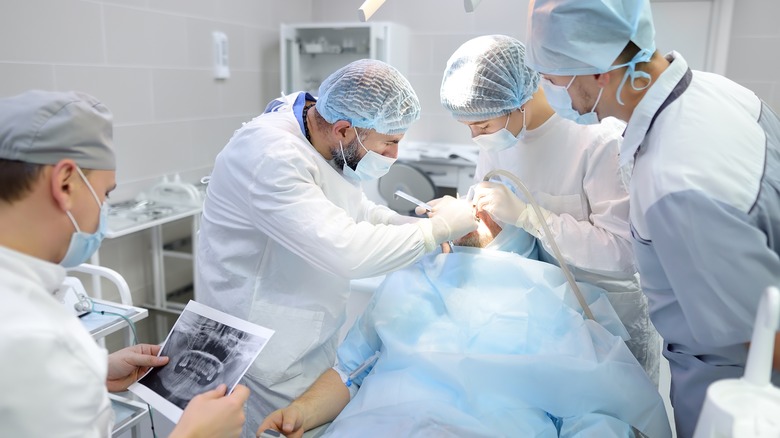What To Expect When You Get Dental Implant Surgery
Millions of Americans suffer tooth decay and loss as they grow older. For many years the only solutions were bridges or dentures, but many people today choose to get dental implants as a permanent solution to damaged or missing teeth (via Mayo Clinic). If you are interested in dental implants, your dentist or oral surgeon will first conduct an evaluation to make sure you are a good candidate. A healthy jawbone is vital for this procedure to work properly. Your dentist will take X-rays of your jaw to determine if you have enough healthy bone for implants to be securely attached. They will also take impressions of your mouth and get color matches of your teeth so the implant will look as natural as possible.
If you are able to move forward with dental implants, your doctor may need to perform a bone graft if you do not have enough jawbone for the implants to be securely inserted. They will usually take a synthetic material and apply it to the site where the new tooth will be placed. You may have to wait a few weeks after a bone graft for the dental implant procedure, but this will depend on how extensive the graft is and what your dentist recommends.
What happens during dental implant surgery
After an examination and a potential bone graft, you will be ready for dental implant surgery. For the procedure, you can choose if you would like to be asleep under general anesthesia or stay awake with the help of painkillers (via Verywell Health). Once your mouth and jaw are numb, your dentist will insert a screw-like metal rod attached to your artificial tooth into your jawbone. The procedure typically takes about two hours to complete.
Once your jawbone has healed around the dental implant, your dentist will apply an abutment to the top of the tooth. This will connect it to the crown that they will apply next. These pieces will protect your implant and mark the end of the dental implant procedure. After surgery, you may feel some jaw pain. You will likely experience some sensitivity and swelling in your mouth after the surgery that can be treated with over-the-counter medications and dietary limits. The recovery process should only take a few days.


